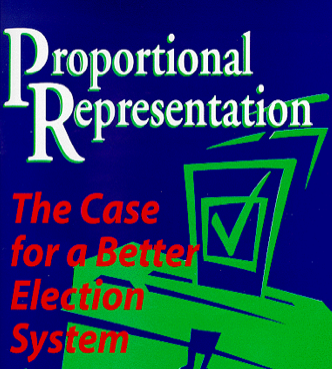 As the initial anger about MPs expenses starts to subside a little, so proposals for more radical changes to British politics emerge as means to restore public confidence in the system. Alan Johnson has backed calls for a referendum on proportional representation, and Ed Miliband has spoken of ‘major reforms’ at Hay (his ideas do however sound rather woolly to me).
As the initial anger about MPs expenses starts to subside a little, so proposals for more radical changes to British politics emerge as means to restore public confidence in the system. Alan Johnson has backed calls for a referendum on proportional representation, and Ed Miliband has spoken of ‘major reforms’ at Hay (his ideas do however sound rather woolly to me).
Tom Harris then comes out with the traditional line from opponents of any sort of radical reform of the system – it’s not about any principle or not, but now is always the wrong time to speak about these sorts of issues.
The research from the Mark Reckons blog is the best example of why these issues are linked – MPs in safe seats have been profiting more from the expenses system than others have.
Lest we forget, some of the most interesting constitutional changes in the last century have been born out of times of considerable upheaval – the German Grundgesetz and the South African Constitution being the prime examples. MPs expenses are nothing in comparison to the end of WWII or the end of apartheid.
Secondly, Harris – like so many politicians – falls into the trap of assuming that politicians have to necessarily lead the process to draft some sort of new constitutional settlement. They speak and write ready to deal with the Daily Mail critique before it has even been penned by that rag’s editors.
It is not beyond the possibilities for a country with the wealth, resources and traditions of the UK to conduct some proper country-wide consultations over the course of a period of months or years to come up with a proper settlement between people and parties.
The problem for Harris (and others such as Jack Straw) is that there is some sort of thought that there’s a way to return to the halcyon days of bi-partisan politics in Westminster, where men of honour fight out the major battles of our time.
No. That time is over. We have a more fractured politics, less deferential, with multiple cleavages and many levels of governance. The creaking British constitutional settlement – thankfully exposed by the expenses scandals – is ripe for reform. And if not now, when?
[UPDATE 26.05.09]
Now David Cameron has added to the debate, promising what The Guardian calls ‘the most dramatic redistribution of power in living memory’. Obviously our living memory is rather short these days, not stretching back to the late 1990s and devolution. For Cameron’s ideas are really rather weedy. Fixed term parliaments, more free votes, MPs to choose chairs of select committees, a more open legislative process, and some vague stuff about local government ‘competence’. Bla, bla, bla. Why did The Guardian even give it space on its front page?








I’ve been waiting for you to establish Project Hemicycle…
I’m all for a bit of reform, but I doubt there will be any meaningful change. We shouldn’t let the disgraced political class set the agenda.